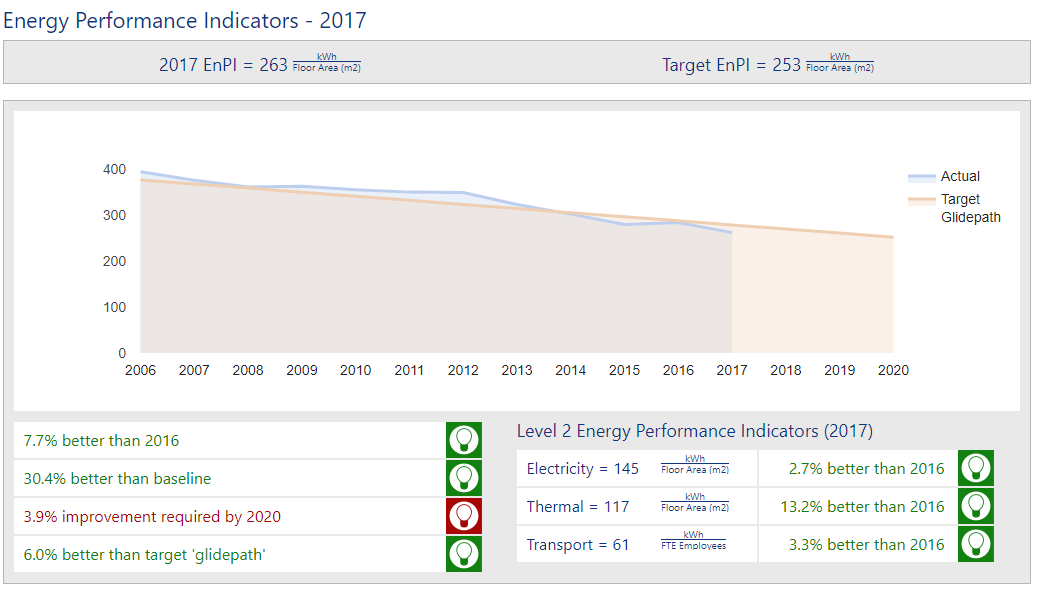2020 Energy Targets
The National Energy Efficiency Action Plan (NEEAP) states that “The public sector will improve its energy efficiency by 33% and will be seen to lead by example — showing all sectors what is possible through strong, committed action.” This 33% target, measured from a baseline of 2006-2008 is an ambitious, but achievable target and requires a focused, but University-wide approach.

The 33% target is an ambitious one, particularly due to the way in which it is measured; improvement in efficiency rather than, for example, usage per m2 compared to other universities. For UCD, who at the beginning of the process had the lowest energy use per m2 of all Universities involved in a pilot study, and have been actively managing energy use for over 20 years, the target is therefore all the more challenging. However, Estates Services is confident that through University-wide involvement this target can be achieved.
Progress is tracked based on an “activity metric” that links energy usage to an activity or driver of energy usage in an organisation. For UCD the main driver of energy usage is the size of the University itself, therefore UCD’s activity metric is kWh (kilo-watt hour) per m2 floor area or the amount of energy used for every m2 of building area in the University. This is a measure of efficiency and allows for growth and to accurately track progress over time. UCD is currently on target based on the most recent available results (2017).
As can be seen in the graph above, UCD is under the “glidepath” at 30.4% or 263kWh per m2. It is expected that results for 2018 will be released by the SEAI (Sustainable Energy Authority of Ireland) in May 2019.
What you can do to help
The impact that the UCD Community can have on energy usage in the University should not be understated. Controls, equipment and other technological mechanisms are just part of the solution. The UCD Community ultimately determines the total energy usage of the campus each day. Simple things like switching off lights and projectors can have a telling effect on consumption.
The Energy Unit is challenging the University community to take part in the annual 100kWh (kilowatt hours) challenge. The challenge is for each staff and student in the University to try to reduce electricity consumption by just 100kWh each year. The University community is composed of over 30,000 staff and students, so 100kWh per person would amount to over 3,000,000kWh or almost €500,000!
How you can save 100kWh!
Through very small changes in the way in which you go about your daily life, you can relatively easily save 100kWh over a year, both in the University and at home. Some people will have more opportunity depending on the area in which they work, others by less, but all will contribute to reduced carbon emissions and help the make the University a more sustainable place to learn, live and work.
– A desktop PC running idle on a screensaver uses 550kWh over a year just on evenings and weekends. Switching off desktop PC each evening for 10 weeks would amount to 100kWh.
– Enable power saver options on your PC or laptop: these are generally in the Control Panel, select System and Security and then Power Options; select “Power Saver”. You can also change the settings to adjust when the screen shuts down and computer sleeps.
– When boiling the kettle only fill with as much water as needed. We could each save 40kWh per year by just doing this one simple measures alone. (of course it depends on how much tea or coffee you drink! – this is based on 3 cups a day!)
– Leaving office and classroom lights on when leaving the room is also a source of wastage. Please switch off when you are leaving, it is very easy for the next person to switch on again!
– “Vampire Power” or standby power is when a piece of equipment is turned off but still using electricity. The amount of power used is generally somewhere between 5-10% of the power being used when fully on. When you consider all the screens, laptops, monitors, TVs and other appliances across the University all using electricity at night and weekends you can understand how it quickly adds up. So please, switch off your computer or laptop and screen at the socket each evening.

